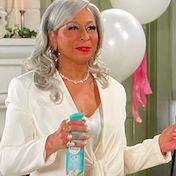If Soaps Were Regarded As Prestige TV...
-
Recently Browsing 0 members
- No registered users viewing this page.
-
Recent Posts
-
By Soaplovers · Posted
The Perkins family had potential to be a nice alternative to the more dysfunctional Capwells and wackier Lockridges... but I think a few factors did in the family. 1) Recasting of Joe Perkins 2) Bad casting of the Perkins Patriarch, and the one note writing for that character. 3) Lack of antagonistic interaction between the Capwells/Lockridges and Perkins. (There was no awkwardness between Jade/Ted.. or CC disapproving of his son being friends with that Perkins girl, etc). 4) Wasting of Jade thus wasting the potential of the actress (which was realized on Days of Our Lives). She had more potential than Laken oddly enough. The only member of the Perkins family that had appeal and a somewhat thought out story arc was Amy. -
By VelekaCarruthers · Posted
@GymnastGuyThanks for posting the three new Capitol 1985 episodes today. The two labeled March 12, and 13 are misidentified. The March 12 labeled one actually aired November 12 1985 which I figured out because Kenny Rogers' movie Wild Horses aired November 12th and it was announced over the "March 12" Cap credits. In addition, Craig Carlson is listed in the April credits but not the March. Craig left Capitol sometime after July 1985 before he rejoined OLTL in the credits by October 15, 1985; he was replaced on Cap by Radcliffe and Hamner. In these posted episodes Radcliffe/Hamner names appear in the March 85 episodes but not in the April. -
5-15 And now...back to the A plot. I can't say enough about how great this week has been that I've been enjoying the fallout from the SilkPress/Eva reveal. I can't believe that it's been almost a week, and it is STILL going on. And they are playing every beat. And rightfully so. It's a strength to the story that this episode is full of mostly those beats with one (okay 2) C plots. I loved how this episode seem centered on dealing with the Bill of it all from his reactions to the reactions of the ones who actually care about him. And meanwhile, Kat getting a clue and connecting it back to the plot thread of Laura's accident. Game recognizes game. My way of saying I loved Bill vs Silk Press Sheila. They have great adversarial chemistry. And I loved that Bill not only gave the heads-up to NuTed, but already figured out that Ted had paid her off. A dumbed-down villain Bill definitely is not. And awww at Naomi walking in on him and NuTed. lol. Like father, like daughter cuz they both stay reading people. Also loved the scene of Naomi and Chels together discussing their feelings about their father in light of the reveal. It's so sad to see Kat thinking in the right direction and STILL took a wrong turn. That said...great to see the Laura plot thread picked up and Kat moving to get to the bottom of it. It's just sad that her strong disdain toward Eva is blinding her to the real threat. Makes her easy prey for SilkPress to manipulate and harder for Eva to get acceptance if people still think she's up to no good. Also intensifies their rivalry. Kat vs Silk Press Sheila was reaaallly good, too. The direction. The camera angles. The lines. Even got background music.
Please register in order to view this content
And...HAHAHA I love how SilkPress Sheila reacts to the word 'crazy' the same way Sheila herself reacts to the word 'bitca' right before one of her catfights on B&B. Honorable mention to another SilkPress vs Eva scene where Eva avoids the gaslight and that Andre/Eva scene where he continues to be there for her. And speaking of the reveal...now that I've seen the full episode...I've warmed to NuTed a bit. I thought in the brief scene I saw on my busy Thursday that he did what I love when a role gets recast. The actor uses some of the mannerisms of their predecessers, but not do a complete parroting of them. And that I felt he pulled off well. It allows for the actor to slowly enter their own vibe to a role and make it their own. And so far...I felt Keith was still...Ted. Love the scenes with NuTed/Kat. But time will tell if I feel he will make it his own. The only good thing I can say about that Andre/Ashley scene...they both have gotten comfortable in their roles, and it was nice to see. I'm Team Dani/Andre over here. That said...I actually am loving the C plot of Ashley, Derek, and the apartment because they are finally getting drama. And I'm actually Team Derek though I completely understand where Ashley is coming from. Thankful that we got that phone call with her mother for her POV and background life. She really is not used to living with someone and what that is like. And it's relatable. But she's handling it all the wrong way. As for their overall place on the canvas though, I can't help, but think about what I said in the first week...they are just meta to me...getting the development...or lack thereof...that black characters get on other soaps...just in reverse. Awww at June saying that she just finds the picture lovely. I don't completely believe her hehe, but it was nice. The anvils about Eva's birthday...smh. lol. -
By I Am A Swede · Posted
I think we have learned by now that you can never be sure anyone's actually dead on a soap... -
By I Am A Swede · Posted
I think this has been one of the best years in a long time. In no small part due to the fact that so many countries have chosen to sing in their native language. Songs like the ones from Greece and Latvia have benefitted immensely from this, and made those two personal favourites of mine. I think Greece has the most incredibly beautiful staging and Klavdia's voice is outstanding. I don't think she has any real chance of winning, but if she did I would be ecstatic. Luxembourg is another favourite of mine and Laura (with her dancers) really sold that song with the new staging. Her performance in the final was flawless and I will be very disappointed if she doesn't improve on last year's result for Luxembourg (13th). -
By Reverend Ruthledge · Posted
If those came from that mass-produced CD that was put out a while back, I'm afraid those episodes are wildly out of order and are very confusing to listen to. I had to painstakingly put them in order to make sense of things. I need to make my own CD to give to people just to try and fix the problem. Thankfully, I had time during the lockdown to do that. Just a word of warning. -
Some spoilery press photos:
Please register in order to view this content
-







Recommended Posts
Archived
This topic is now archived and is closed to further replies.